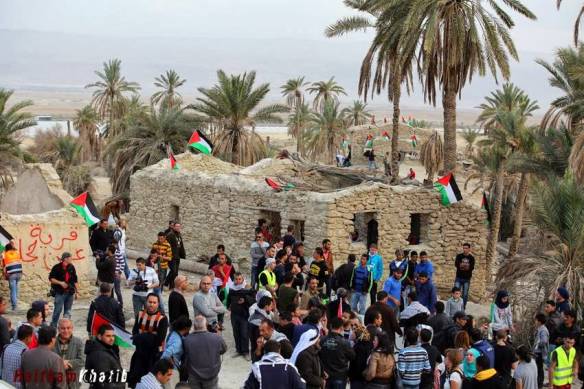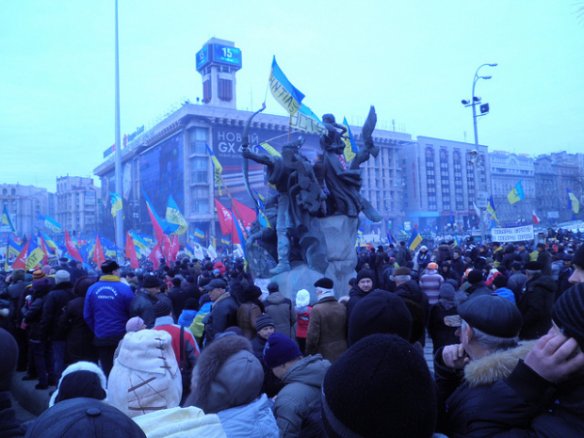 In March/April 2014 Myanmar will carry out its first population and housing census in more than 30 years. If carried out properly it may provide reliable data to be used not just by the government, but also by civil society organizations and political parties, as a basis for negotiating the terms of the country’s future peace.Read More
In March/April 2014 Myanmar will carry out its first population and housing census in more than 30 years. If carried out properly it may provide reliable data to be used not just by the government, but also by civil society organizations and political parties, as a basis for negotiating the terms of the country’s future peace.Read More
Ein Hijleh: A new Boost for the Popular Resistance

The grassroots popular resistance movement in the West Bank continues its strategy of reclaiming Palestinian land to highlight how Israel slowly annexes big parts of the West Bank. This time they did not establish a new village, like the case was in early 2013, with Bab al-Shams and its offshoots. Instead, they re-established an existing village in the vicinity of Jericho. Its inhabitants were expelled by the Israeli army, which established a base near the site. Their descendants have been denied access to the village ever since.
Read more in the blog post published February 12, 2014 on the New Middle East Blog
Monitoring the situation in South Sudan
15 December 2013 conflict broke out between army fractions in South Sudan. So far, more than 1000 are said to be dead and 800,000 to have fled their homes in the world’s newest state. The conflict has generated considerable media attention and developments are followed by the Norwegian government and other countries which have invested… Read more »
Where has the violence taken place?
USAID has published an updated map on the reported incidents of Violence in South Sudan since 15 December.
The Syrian Refugee Crisis and Conflict Spillover
The Syrian refugee crisis has been heartbreaking to watch. According to the United Nations, over 2.4 million people have fled the country, and many more have been displaced internally. This human tragedy has shocked the world’s conscience and has led for appeals for humanitarian relief. However, does the influx of hundreds of thousands of refugees also pose security challenges for host countries?

A close-up view of the Za’atri camp for Syrian refugees. Photo from Wikipedia
Today, PRIO researcher Kristian Skrede Gleditsch and Idean Salehyan have published a guest blog post on Political Violence @ a Glance. Read More
Four Reasons Why Interstate Conflict Scholars Don’t Read Intrastate Work and Why They are Wrong, Part 2
Part 1 of this two-part series is here.
Misconception #3 – “The Domestic Conflict Field is a Mess”
Misconception #4 -”There is No Good Data on Civil Conflict“
Read more at Political Violence @ a Glance, published January 30, 2014
Nepal Moves Towards Democracy
Democracy is to a large extent about parties being willing to accept electoral defeat. In Nepal the Maoist Party, previously engaged in guerrilla warfare, has done precisely this.Read More
Global warming and melting of Arctic ice
Rossiiskaya gazeta published a report from a scientific conference where the proposition on global warming and melting of Arctic ice was effectively disproved. The fact that September 2013 ice was by as much as 50% larger than September 2012 ice is indeed under-reported. What is odd about this emphasis, however, is that it goes strictly… Read more »
Four Reasons Why Interstate Conflict Scholars Don’t Read Intrastate Work and Why They are Wrong, Part 1
Misconception #1 – “Intrastate Conflict Is Just Not as Important as Interstate Conflict”
Misconception #2 – “Intrastate Conflict Has No Relevance to Interstate Conflict”
Read more at Political Violence @ a Glance, published on January 21, 2014
Old Wine in an E-bottle (or, The Text that Mistook Itself for a Tactical Shift)

Photo by Flickr user Jose Luis Orihuela.
On January 24th Barbara Walter wrote a fascinating blog entry entitled “The Text that Changed the World”. It noted that the “Ukrainian government” had issued a text message to “thousands of protesters” effectively telling them that they had been busted (i.e., they were identified as participating in a protest event). While it is useful to think about the impact of this action on subsequent challenging behavior, given my interest in the end of repressive action it seemed useful to reflect for a moment as to how the text might be relevant.
… Blog post by PRIO Global Fellow Christian Davenport on the blog Political Violence @ a Glance